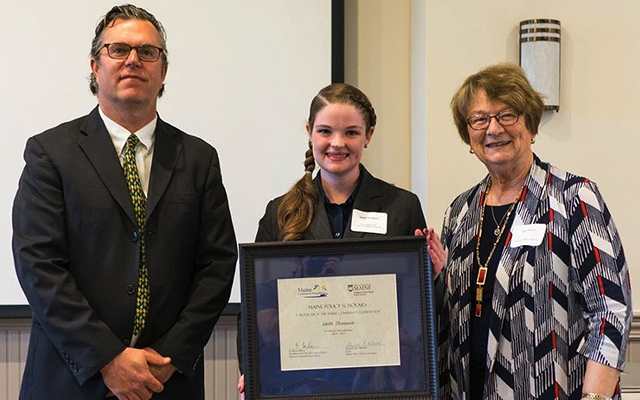
PRESQUE ISLE, Maine — As part of the Maine Community Foundation’s Maine Policy Scholars Program, students from campuses throughout the University of Maine System pursued a year-long program of applied research in the area of Maine public policy during the 2016-2017 academic year.
At the University of Maine at Presque Isle, Idella Thompson served as the institution’s Maine Policy Scholar. Thompson, a native of Caribou, recently graduated from UMPI with a bachelor’s degree in criminal justice with minors in pre-law and women’s studies. During her Maine Policy research year, Thompson looked at protection from abuse (PFA) orders in Maine and improvements that could be made.
This research sprang out of a service learning project that took place two years ago in a domestic violence class taught by UMPI criminal justice professor Dr. Lisa Leduc. Hope and Justice Project had approached Leduc about having students gather data regarding PFA orders on behalf of the nonprofit. Students who undertook this project, including Thompson, collected data concerning protection from abuse orders filed in Aroostook County courthouses from 2010 to 2014.
Thompson and her fellow researchers spent hundreds of hours reviewing 1,600 PFA files, gathering about 80 variables from each file. She finished that process during a summer field experience class. She noted demographic information, what led victims to receive a protection from abuse order, what victims requested on the release, what the judge gave them for relief, and if there were children involved.
“One of the things that was statistically significant was that the only way to be guaranteed to get an order is to have a lawyer,” Thompson said, “which is backwards because the process is supposed to be pro se, which means you can do it yourself, but that’s not necessarily the case.”
After completing her initial research, Thompson applied to the Maine Policy Scholar program in hopes of presenting her recommendations to a broader audience. She conducted interviews with law enforcement officials, a judge, district attorneys, defense attorneys and victim advocates, who discussed what they felt worked effectively and changes they would recommend regarding PFA orders in Maine.
Based on the file reviews and interviews, Thompson made three recommendations. She suggested that Maine courthouses use standard PFA order forms, which are easier for people to understand, instead of a more complicated agreement that is worked out in court. She also recommended that the state provide victims with a court-appointed attorney to answer any questions, and that the form include a box that a judge can check that indicates the plaintiff cannot contact the defendant.
Thompson presented her findings and recommendations to a panel of Maine legislative officials at the University of Maine at Orono in April.
“We have worked on this for a really long time. It’s exciting to finally have our actual recommendations that have come out of the whole process,” Thompson said. “I hope that people can take it to heart and reflect on some of the issues that the PFA system has.”
Thompson is grateful to the Maine Policy Scholar program for allowing her to present her findings in a public setting with the goal of influencing positive change. Her hope is that the work will continue with another UMPI student who could conduct a follow-up study, and that her current research will be used to help implement changes within Maine’s PFA system.
“It has been very exciting to see Idella work on this research for over two years,” Dr. Leduc said. “She has been able to present at two academic conferences and her final policy memo has already been used by town managers to help in law enforcement training on the process of PFA’s. Everyone that she interviewed had the opportunity to request information from our data set; I will be following up with those stakeholders to provide further outcomes from our statistical analysis.”
The Maine Policy Scholars Program was conceived by the late Peter Cox and funded by many donors as a means of engaging students in the University of Maine System in the public policy process. The program is managed by the Maine Community Foundation with input from an advisory committee.







